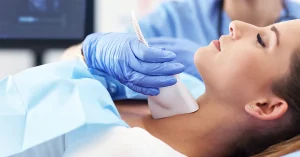Thyroid Surgery
A decision based on accurate diagnosis and expert advice
Home » Endocrine Surgery » Thyroid Surgery
Medical Procedures
Thyroid and Parathyroid
- Thyroidectomy + Lymphadenectomy
- Subtotal Parathyroidectomy
Neuroendocrine Tumors
- Pancreatic Neuroendocrine Tumor Removal
Adrenal

Thyroid disorders can go unnoticed for a long time, but the presence of nodules, goiter, or persistent hormonal imbalances can signal a serious problem.
In such cases, thyroid surgery becomes the necessary solution to restore health and prevent long-term complications.
Book an Appointment
What is thyroid surgery?
Thyroid surgery, also known as thyroidectomy, is a surgical procedure that removes part or all of the thyroid gland, depending on the diagnosed condition. This procedure is indicated in cases such as:
- Thyroid nodules with oncological risk;
- Multinodular goiter;
- Severe hyperthyroidism (Graves’ disease);
- Thyroid cancer.
The procedure is usually performed by an ENT surgeon or endocrine surgeon in a specialized hospital setting.
When is thyroid surgery necessary?
Thyroid gland surgery is recommended when drug treatments are ineffective or when malignancy is suspected. Signs that may indicate the need for surgery include:
- Large or rapidly growing thyroid nodules;
- Throat pain or difficulty swallowing;
- Persistent hormonal imbalances;
- Abnormal ultrasound or cytology results.
Types of surgical procedures
There are several types of thyroid gland surgery, depending on the severity and location of the condition:
- Total thyroidectomy: the entire thyroid gland is removed;
- Thyroid lobectomy: only one thyroid lobe is removed;
- Partial thyroidectomy: a limited procedure, rarely used.
The decision is made by the doctor based on the patient’s diagnosis.
How does thyroid surgery work?
The procedure is performed under general anesthesia and lasts, on average, between 1 and 2 hours. The stages of the procedure include:
- Admission of the patient (one day before or on the morning of the procedure);
- Preoperative preparation (tests, anesthetic consultation);
- The actual operation;
- Postoperative monitoring and recovery.
Most patients can be discharged 1–2 days after the procedure.
How long does thyroid surgery take?
Thyroid surgery takes between 60 and 120 minutes on average, depending on the complexity, the experience of the surgical team, and the type of procedure (total or partial).
Life after thyroid surgery
Patients can lead a completely normal life after the procedure, provided that:
- They follow their doctor’s instructions;
- They undergo hormone replacement therapy (if necessary);
- They attend regular endocrinology check-ups.
Physical activity, diet, and professional life can be gradually resumed within 2–4 weeks.
Recovery after thyroid surgery
Recovery is generally rapid and includes:
- Light vocal rest for the first few days;
- Avoiding strenuous activity for 2–3 weeks;
- Taking the prescribed treatment;
- Monitoring thyroid hormones (TSH, FT4).
The scar heals within a few weeks and can be improved cosmetically with local treatments.
Thyroid gland surgery price
The price of thyroid surgery varies depending on the type of procedure and the complexity of the case. It is important to understand that a fixed cost cannot be provided without a prior consultation.
Each case is different, and the surgery must be tailored to the particularities of each patient—from the type of nodules and hormone tests to medical history.
We recommend scheduling a consultation, during which the doctor will assess the clinical situation and will be able to propose the safest and most effective personalized surgical solution. Based on this assessment, you will also receive a detailed quote regarding the costs involved.
Why choose our clinic for thyroid surgery?
- Medical team with experience in thyroid surgery;
- Modern technology and excellent hospital conditions;
- Postoperative endocrinological monitoring;
- Transparency regarding prices and flexible payment options.
Schedule an appointment
If you have been referred for thyroid surgery or are experiencing specific symptoms, we encourage you to schedule a consultation. We will evaluate your case and offer you the best treatment options.
Fill out the form below or call us to schedule a personalized consultation.
Our specialists will answer all your questions and provide you with a treatment plan tailored to your needs, ensuring that you receive the best medical care.
Medical Team
Frequently Asked Questions
Is thyroid surgery painful?
No, the operation is performed under general anesthesia. Postoperative discomfort is minimal and controlled with painkillers.
How long will I be hospitalized after thyroid surgery?
Patients generally remain hospitalized for 1–2 days after the procedure.
Will there be a scar after the surgery?
Yes, there will be a small scar at the base of the neck, which will fade over time. There are also surgical options with minimal incisions.
Will I be able to speak normally after the operation?
Yes, but you may experience slight temporary hoarseness. In rare cases, your voice may be affected if your vocal cords are damaged.
What tests should be done before thyroid surgery?
Blood tests (TSH, FT4, calcitonin), thyroid ultrasound, fine needle aspiration (FNA), and EKG, among others.
Do I need to take medication after thyroid surgery?
Yes, if the entire gland is removed, thyroid hormones are administered daily for life.

